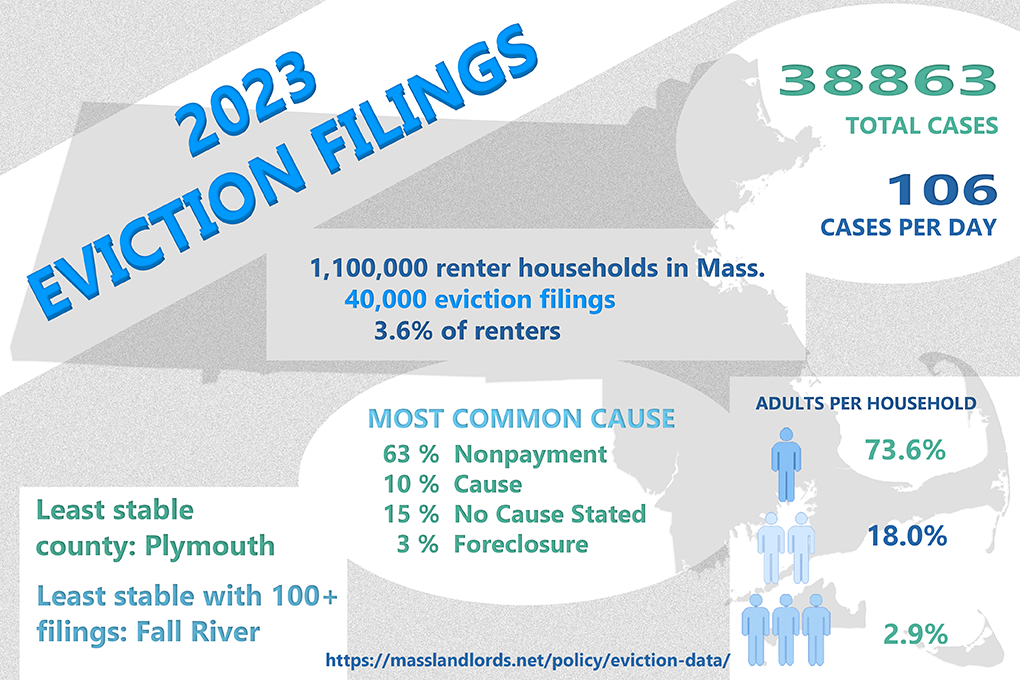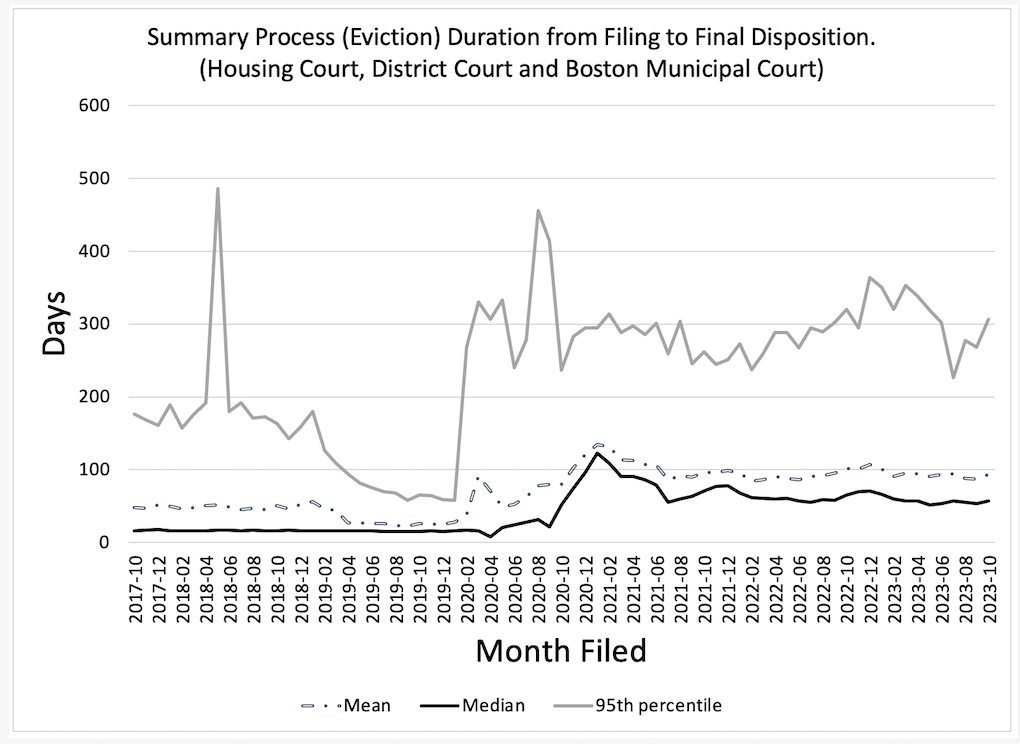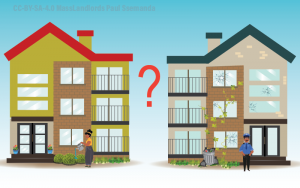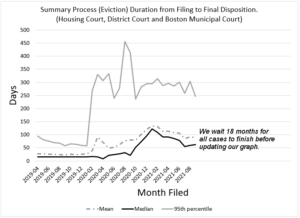Massachusetts Eviction Data and Housing Court Statistics
Since May 2020 MassLandlords has compiled eviction outcomes monthly. The Massachusetts eviction process is called “summary process.” It is not legal for a landlord to evict a renter without filing for “summary process.” These filings are a public record and can be inspected in detail or in aggregate by anyone. The eviction data we are now compiling add detail to the Massachusetts Trial Court statistics released each fiscal year. For instance, the trial courts show total summary process filings each year. MassLandlords now compiles total filings by division by month.
Since December 2020, MassLandlords has published weekly housing court eviction filings.
The eviction data reports are split into two categories:
- Filings: Staff read dockets for recently filed cases, summaries published weekly; and
- Outcomes: Staff read dockets for cases filed approximately 18 months ago, summaries published monthly.
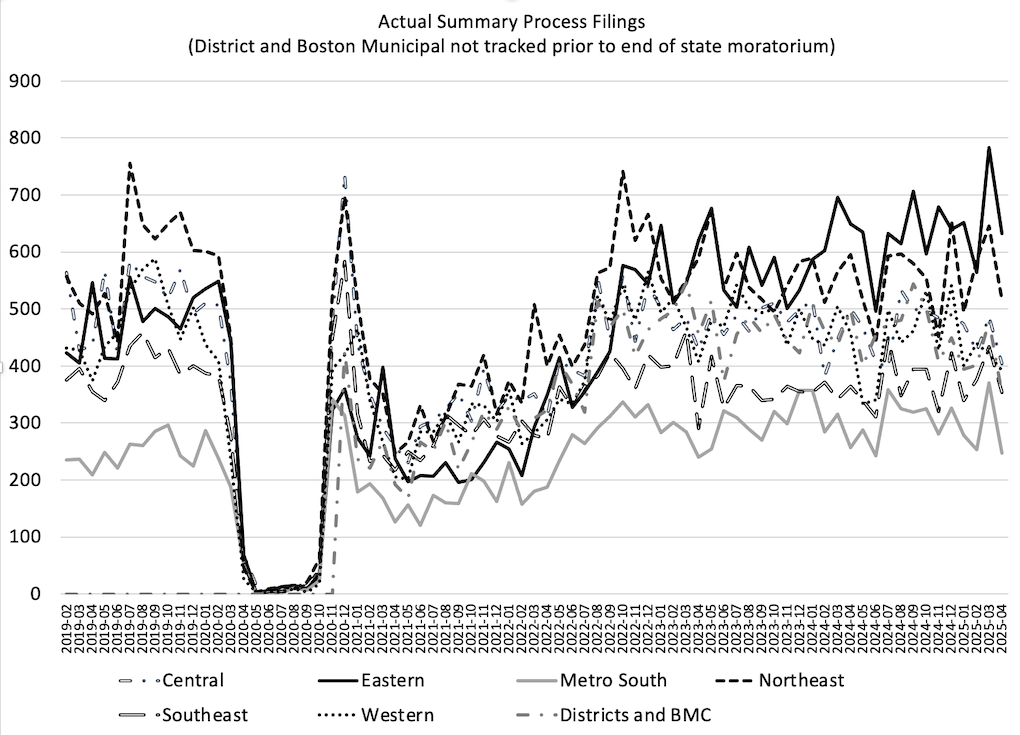
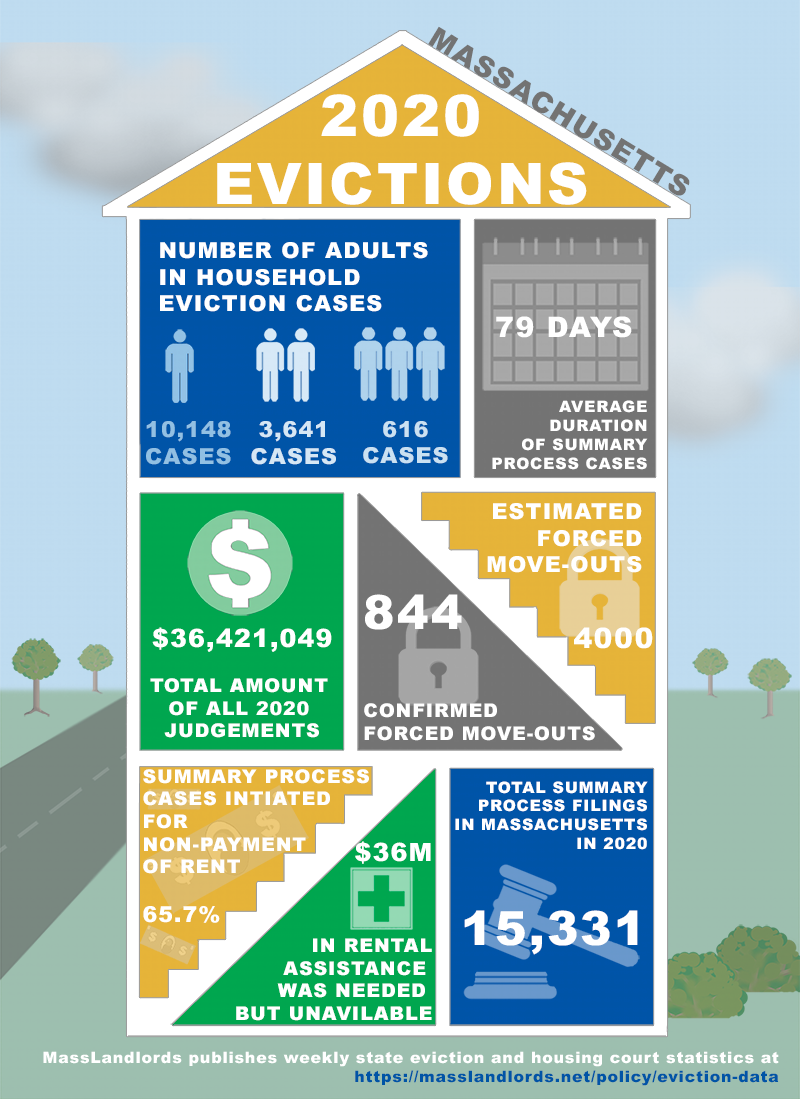
CC BY-SA 4.0 Jennifer Rau MassLandlords
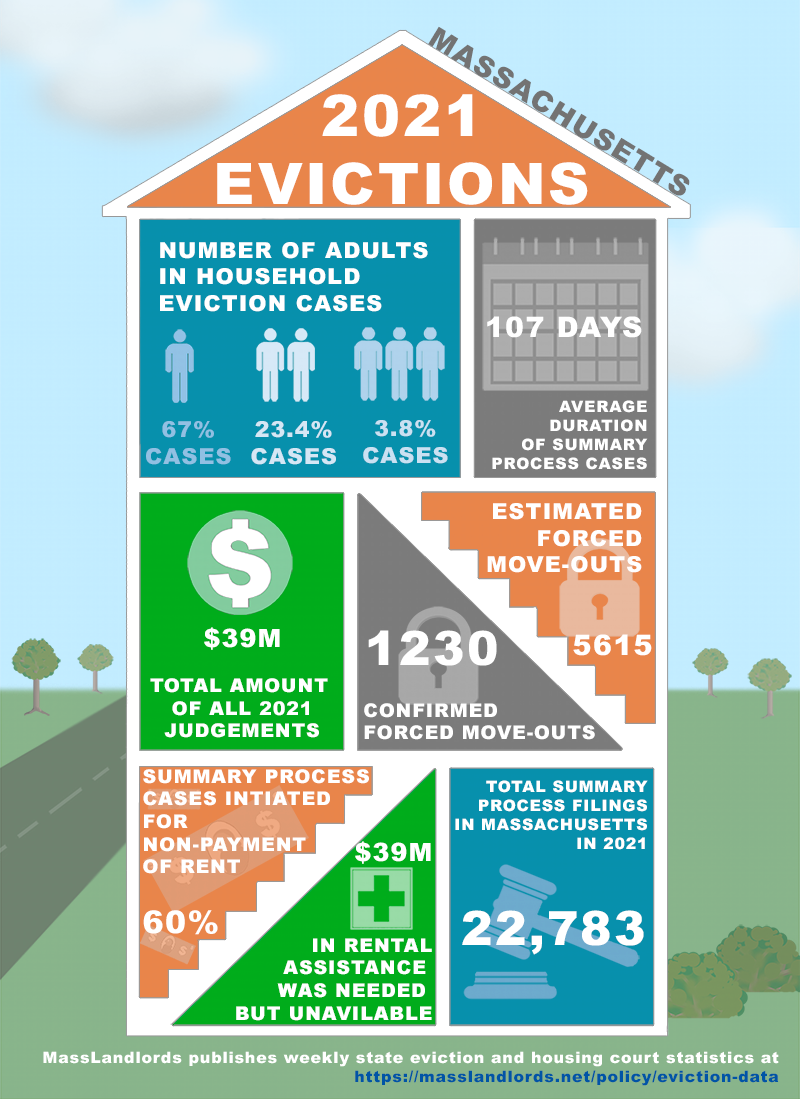
CC BY-SA 4.0 Jennifer Rau MassLandlords
Filings Are Not Forced Move-Outs
Note that summary process is the legal term for the court procedure where a landlord requests enforcement of a rental agreement. The overwhelming majority of summary process actions end without an eviction, or a forced move-out. For instance, many landlords and renters mediate in court and agree to a payment plan. Other mediated agreements might include a voluntary (non-forced) move-out at a mutually agreeable date in the future, sometimes months or a year after. Note also that a host of individuals intervene with the purpose of preventing forced move-outs. Help comes from Residential Assistance for Families in Transition (RAFT), the Tenancy Preservation Program (TPP), and even judges themselves when they enforce the law on sanitary code conditions, security deposits, and much more.
The confusion between forced move-outs and summary process actions has been worsened by misreporting. As an example of such misreporting, we detailed the Boston Globe’s carelessness in “Global (Over)Reach: Boston Globe Stokes Eviction Fear with Falsehoods,” April 19, 2019.
Summary process filings result in a forced move-out only about 10% of the time.
Note that these data do not consider non-judicial resolution. For instance, “cash for keys” is a lawful non-judicial resolution for which we have little data. In a “cash for keys” arrangement, the landlord and the renter agree to part ways without the need for legal assistance. To give another example, “lockouts” would be an unlawful non-judicial resolution. Every lockout can be reversed by law enforcement. (If you believe you have been locked out of your apartment by your landlord, call the police.)
This eviction data includes only court procedures.
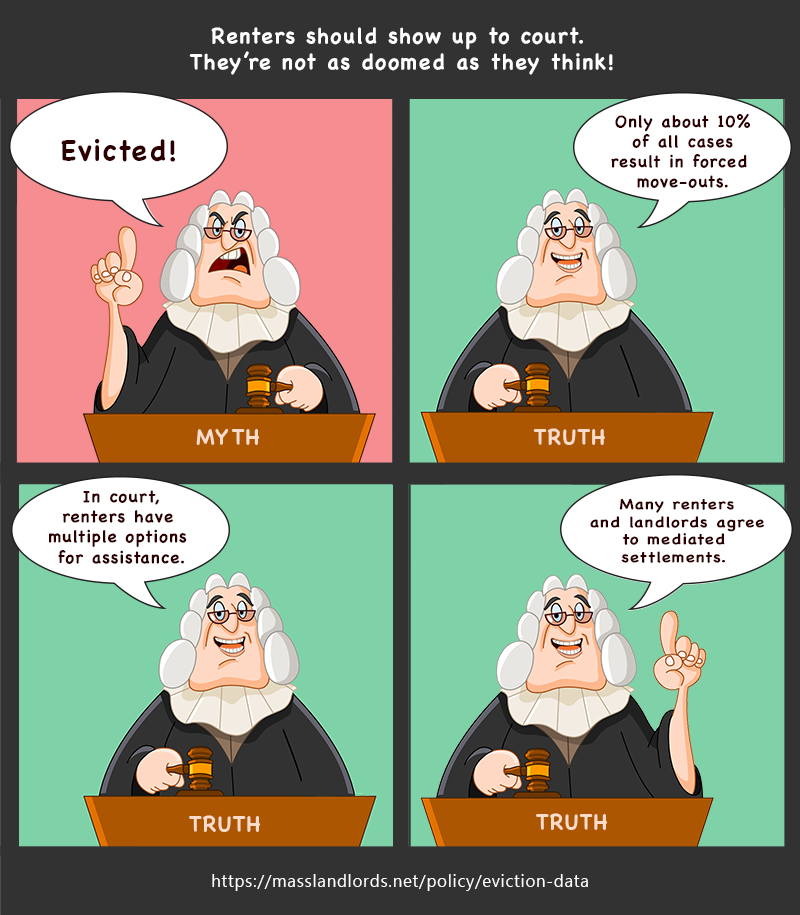
Derivative of Licensed 123rf.
Filing Reports
We read cases within one week of filing.
Filing reports by week
2020
- Week ending 2020-10-24
- Week ending 2020-10-31
- Week ending 2020-11-07
- Week ending 2020-11-14
- Week ending 2020-11-21
- Week ending 2020-11-28
- Week ending 2020-12-05
- Week ending 2020-12-12
- Week ending 2020-12-19
- Week ending 2020-12-26
- Week ending 2021-01-02
2021
- Week ending 2021-01-09
- Week ending 2021-01-16
- Week ending 2021-01-23
- Week ending 2021-01-30
- Week ending 2021-02-06
- Week ending 2021-02-13
- Week ending 2021-02-20
- Week ending 2021-02-27
- Week ending 2021-03-06
- Week ending 2021-03-13
- Week ending 2021-03-20
- Week ending 2021-03-27
- Week ending 2021-04-03
- Week ending 2021-04-10
- Week ending 2021-04-17
- Week ending 2021-04-24
- Week ending 2021-05-01
- Week ending 2021-05-08
- Week ending 2021-05-15
- Week ending 2021-05-22
- Week ending 2021-05-29
- Week ending 2021-06-05
- Week ending 2021-06-12
- Week ending 2021-06-19
- Week ending 2021-06-26
- Week ending 2021-07-03
- Week ending 2021-07-10
- Week ending 2021-07-17
- Week ending 2021-07-24
- Week ending 2021-07-31
- Week ending 2021-08-07
- Week ending 2021-08-14
- Week ending 2021-08-21
- Week ending 2021-08-28
- Week ending 2021-09-04
- Week ending 2021-09-11
- Week ending 2021-09-18
- Week ending 2021-09-25
- Week ending 2021-10-02
- Week ending 2021-10-09
- Week ending 2021-10-16
- Week ending 2021-10-23
- Week ending 2021-10-30
- Week ending 2021-11-06
- Week ending 2021-11-13
- Week ending 2021-11-20
- Week ending 2021-11-27
- Week ending 2021-12-04
- Week ending 2021-12-11
- Week ending 2021-12-18
- Week ending 2021-12-25
- Week ending 2022-01-01
2022
- Week ending 2022-01-08
- Week ending 2022-01-15
- Week ending 2022-01-22
- Week ending 2022-01-29
- Week ending 2022-02-05
- Week ending 2022-02-12
- Week ending 2022-02-19
- Week ending 2022-02-26
- Week ending 2022-03-05
- Week ending 2022-03-12
- Week ending 2022-03-19
- Week ending 2022-03-26
- Week ending 2022-04-02
- Week ending 2022-04-09
- Week ending 2022-04-16
- Week ending 2022-04-23
- Week ending 2022-04-30
- Week ending 2022-05-07
- Week ending 2022-05-14
- Week ending 2022-05-21
- Week ending 2022-05-28
- Week ending 2022-06-04
- Week ending 2022-06-11
- Week ending 2022-06-18
- Week ending 2022-06-25
- Week ending 2022-07-02
- Week ending 2022-07-09
- Week ending 2022-07-16
- Week ending 2022-07-23
- Week ending 2022-07-30
- Week ending 2022-08-06
- Week ending 2022-08-13
- Week ending 2022-08-20
- Week ending 2022-08-27
- Week ending 2022-09-03
- Week ending 2022-09-10
- Week ending 2022-09-17
- Week ending 2022-09-24
- Week ending 2022-10-01
- Week ending 2022-10-08
- Week ending 2022-10-15
- Week ending 2022-10-22
- Week ending 2022-10-29
- Week ending 2022-11-05
- Week ending 2022-11-12
- Week ending 2022-11-19
- Week ending 2022-11-26
- Week ending 2022-12-03
- Week ending 2022-12-10
- Week ending 2022-12-17
- Week ending 2022-12-24
- Week ending 2022-12-31
2023
- Week ending 2023-01-07
- Week ending 2023-01-14
- Week ending 2023-01-21
- Week ending 2023-01-28
- Week ending 2023-02-04
- Week ending 2023-02-11
- Week ending 2023-02-18
- Week ending 2023-02-25
- Week ending 2023-03-04
- Week ending 2023-03-11
- Week ending 2023-03-18
- Week ending 2023-03-25
- Week ending 2023-04-01
- Week ending 2023-04-08
- Week ending 2023-04-15
- Week ending 2023-04-22
- Week ending 2023-04-29
- Week ending 2023-05-06
- Week ending 2023-05-13
- Week ending 2023-05-20
- Week ending 2023-05-27
- Week ending 2023-06-03
- Week ending 2023-06-10
- Week ending 2023-06-17
- Week ending 2023-06-24
- Week ending 2023-07-01
Starting in the second half of 2023, we no longer publish weekly filings. If you want a report on filings for any given week not listed above, email us at hello@masslandlords.net.
Filing reports by month
2020
2021
2022
2023
2024
2025
Filing reports by quarter
2021
- Quarter ending 2021-03-31
- Quarter ending 2021-06-30
- Quarter ending 2021-09-30
- Quarter ending 2021-12-31
2022
- Quarter ending 2022-03-31
- Quarter ending 2022-06-30
- Quarter ending 2022-09-30
- Quarter ending 2022-12-31
2023
- Quarter ending 2023-03-31
- Quarter ending 2023-06-30
- Quarter ending 2023-09-30
- Quarter ending 2023-12-31
2024
- Quarter ending 2024-03-31
- Quarter ending 2024-06-30
- Quarter ending 2024-09-30
- Quarter ending 2024-12-31
2025
Filing reports by year
2021
2022
2023
2024
Outcomes Reports
We read cases 18 months after filing to be sure that at least 90% of cases read will have been resolved.
Outcomes reports by month
2017
2018
2019
2020
2021
2022
2023
We wait 18 months to ensure that 99% of eviction cases are resolved one way or another before re-reading the court data.
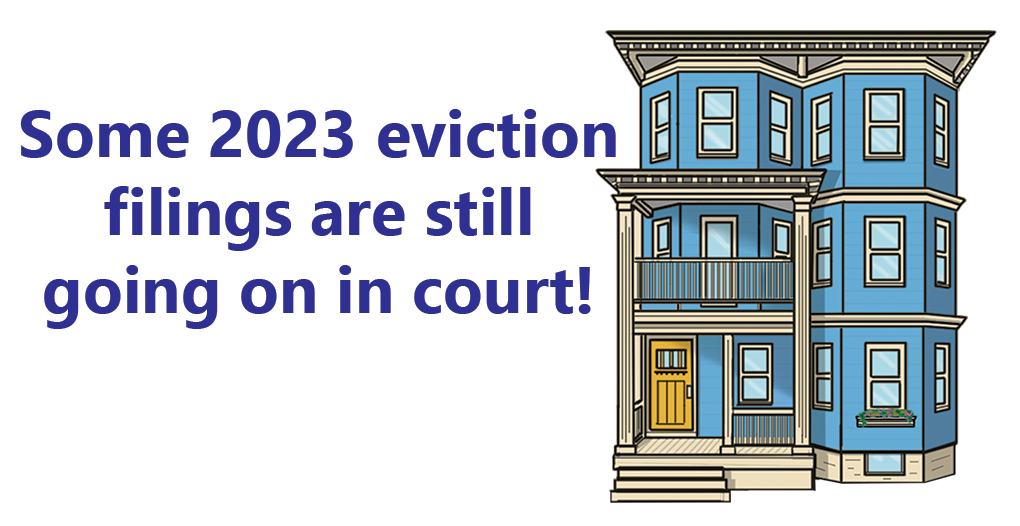
CC BY-SA 4.0 Jennifer Rau MassLandlords
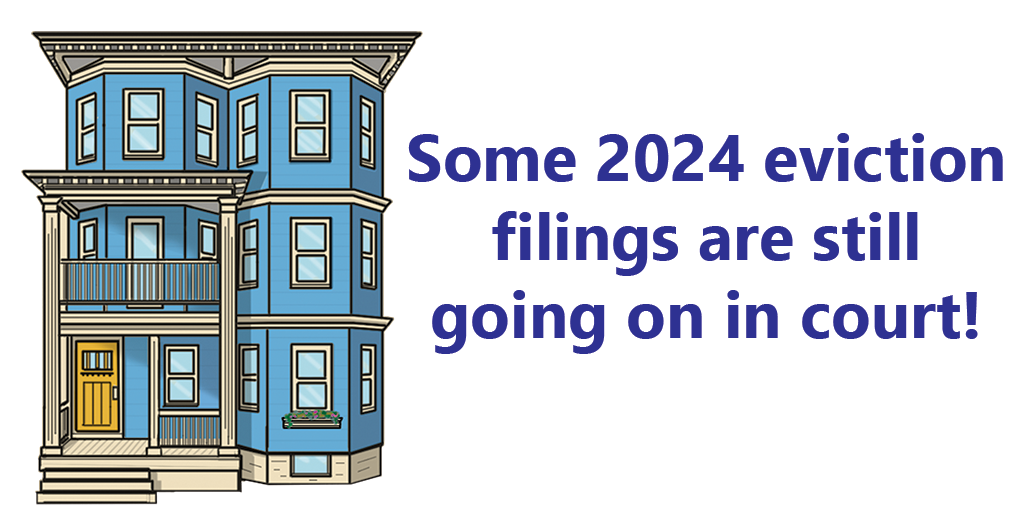
CC BY-SA 4.0 Jennifer Rau MassLandlords
Outcomes reports by year
2018
2019
2020
2021
2022
What Kinds of Questions Can These Massachusetts Eviction Data Reports Answer?
MassLandlords eviction data reports can answer policy questions like:
- How many adults are in each defendant household? (Answer: ~Two-thirds of households are single adult.)
- Why are these households being taken to court? (Answer: ~80% of cases are about non-payment of rent).
- What percent of landlords are required to hire an attorney? (Answer: ~75% of landlords are corporations required to hire an attorney).
- Where are these households? (Answer: Before the pandemic, gentrifying neighborhoods. After the pandemic, gateway cities.)
- What percent of filings result in a forced move-out? (Answer: < 10%).
- How frequently does mediation result in an agreement? (Answer: ~50% of the time).
- How long do evictions take? (Answer: Court duration, excluding time before and after court, is ~30 days.)
- How much money does an average household lack when they get removed for non-payment? (Pre-pandemic answer: ~$2,500)
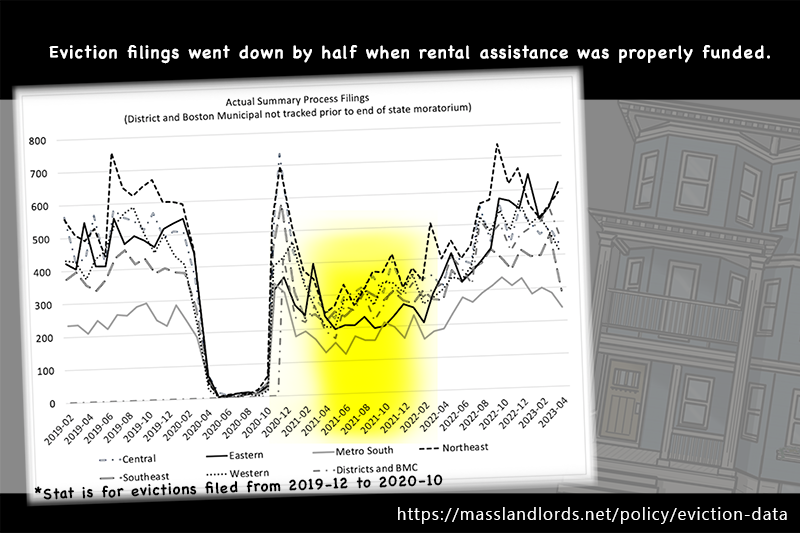
CC BY-SA 4.0 Jennifer Rau MassLandlords
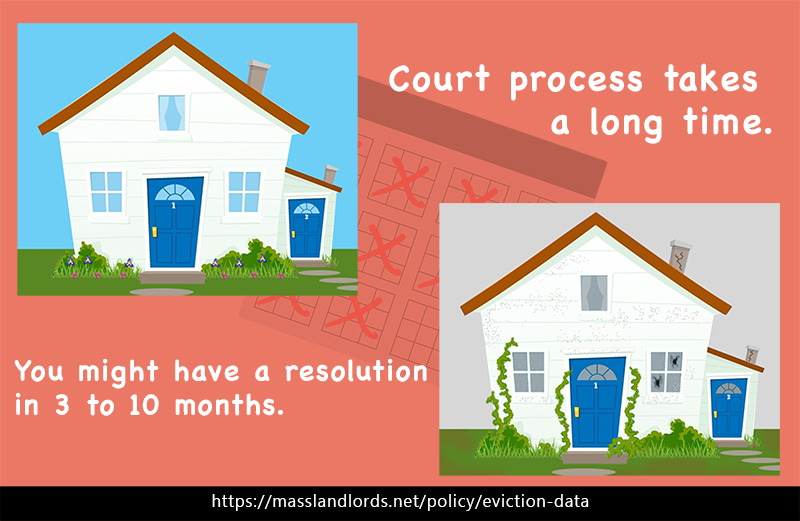
cc by-sa Jennifer Rau MassLandlords
What Kinds of Questions Can These Massachusetts Eviction Data Reports Not Answer?
- Has this applicant for my apartment ever been filed against? (We currently do not report on individual renter names.)
- What are common terms and conditions of mediated agreements? (We do not read case attachments.)
- Where do renters go if they are forcibly removed? (The courts do not follow up with renters.)
- How large are these landlords? (Landlord ownership count is not tracked by the courts.)
Landlords Have More Attorneys by (Unwanted) Law
Per Massachusetts case law, any landlord using a corporate entity (LLC, Trust, etc.) must hire an attorney. Our data indicate that when given the choice, more than half of landlords are small enough that they do not want to hire an attorney.
The difference between landlords and renters is not as great as between, say, credit card companies and debtors. Big banks and financial institutions all get lawyers, but people with credit card debt do not. If the taxpayers are to fund a civil right to counsel, we propose this might be better started with debt collection than housing. Landlords are mostly ordinary people and we don't want to have the expense of hiring an attorney. The playing field in housing court can be leveled much more thoroughly for much less expense by de-escalating the lawyer arms race and applying public funds to rental subsidies rather than lawyers. 80% of cases are about non-payment of rent.
Our free solution to more equal representation: Start by letting officers of LLC's represent their LLC.
Previous Eviction Data: Eviction Study for Massachusetts Part One
In 2016, MassLandlords published “Eviction Study for Massachusetts Part One”, a detailed assessment of 8,000 cases filed in Housing Court in 2014. This study of eviction data produced several key findings. There were statistically significant differences in the length, and therefore the cost, of evictions in Housing Court vs. District Court. For instance, a case filed in District Court was 30% more likely to end before an unpaid rent judgment reached $1,500, whereas a case filed in Housing Court was 18% more likely to accrue over $10,000 in unpaid rent.
The study controverted a then-frequent renter advocate refrain. Advocates used to say that evictions could be accomplished in as little as seven days, intending to argue that evictions were not lengthy. The eviction study clearly demonstrated that the average court time was 38 days, with the longest being one year, three months, two weeks and two days before the landlord was finally awarded possession. The seven-day eviction timeframe applied only to mediated agreements for judgment.
The study placed court duration in the context of notice and repair time, which for a landlord adds to length of an eviction above and beyond court time.
The cost and delay associated with a court eviction mean that most mom and pop landlords attempt to negotiate with renters rather than filing for eviction.
External Links
- Massachusetts Trial Court, Department of Research and Planning, Dashboards
- The Social and Institutional Contexts Underlying Landlords’ Eviction Practices, Henry Gomory, Social Forces 2021 June 16, an in-depth study of 15 years of Boston housing data, examining how large and small landlords approach evictions differently

